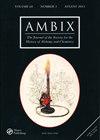Alchemy, Sources, and Digital Exploring at the Herzog August Bibliothek Wolfenbüttel
IF 0.3
3区 哲学
Q3 HISTORY & PHILOSOPHY OF SCIENCE
引用次数: 0
Abstract
The Herzog August Bibliothek Wolfenbüttel (also known as the Bibliotheca Augusta) has long been considered one of the most important research locations for projects focused on medieval and early modern European studies. Founded and enlarged by the German princes Julius (1528–1589), Heinrich Julius (1568– 1613), and Augustus (1579–1666) of Brunswick-Lüneburg, the library today emphasises the collection of manuscripts and early modern printed works and welcomes researchers from numerous disciplines. Among its holdings, the Herzog August Bibliothek possesses, for the period from the fifteenth through the eighteenth centuries, around a hundred manuscripts and more than 2,000 printed works related to alchemy, and those sources have helped establish the library as one of the most important centres for alchemical research. Thirty-eight years ago the library hosted its first major symposium focused on historical alchemy under the umbrella of the Sixteenth Wolfenbüttel Symposium (1984). The meeting, international in scope, was organised by Christoph Meinel, who edited the significant volume to follow, Die Alchemie in der europäischen Kulturund Wissenschaftsgeschichte. In his introduction to that volume, Meinel reflected on the rallying appeal of Wilhelm Ganzenmüller (1882–1955) in 1953, i.e. more than thirty years earlier, to organise an international effort in order to respond to what Ganzenmüller viewed as the most glaring desiderata affecting alchemical research in historical context. Most pressing was the need for cataloguing all known alchemical manuscripts. This should be accompanied by a list of incipits of the texts themselves, linking them to neighbouring natural-philosophical and technical literature. There should be a catalogue of images and a historical dictionary describing the etymology of alchemical terminology, and one should also build a bibliography of source materials supplemented by a bibliography of research literature, including contributions from literary, artistic, religious, and technological炼金术,资源和数字探索在赫尔佐格奥古斯特图书馆wolfenbttel
Herzog August Bibliothek wolfenbttel(也被称为Bibliotheca Augusta)长期以来一直被认为是中世纪和早期现代欧洲研究项目最重要的研究地点之一。由德国王子朱利叶斯(1528-1589),海因里希朱利叶斯(1568 - 1613)和奥古斯都(1579-1666)的不伦瑞克- 内堡建立和扩大,图书馆今天强调手稿和早期现代印刷作品的收集,并欢迎来自众多学科的研究人员。其中,赫尔佐格奥古斯特图书馆拥有从15世纪到18世纪的大约100份手稿和2000多份与炼金术有关的印刷作品,这些资源帮助图书馆成为炼金术研究最重要的中心之一。38年前,在第16届wolfenbttel研讨会(1984年)的框架下,图书馆举办了第一次以历史炼金术为主题的大型研讨会。这次国际范围的会议是由Christoph Meinel组织的,他编辑了之后的重要著作《Die Alchemie in der europäischen Kulturund Wissenschaftsgeschichte》。在这本书的前言中,Meinel回顾了Wilhelm ganzenm ller(1882-1955)在1953年(即三十多年前)的号召,即组织一次国际努力,以回应ganzenm ller认为在历史背景下影响炼金术研究的最明显的愿望。最迫切的是需要对所有已知的炼金术手稿进行编目。这应该附有一份文本本身的标题列表,将它们与邻近的自然哲学和技术文献联系起来。应该有一个图像目录和一本描述炼金术术语词源的历史词典,还应该建立一个原始材料的参考书目,辅以研究文献的参考书目,包括文学、艺术、宗教和技术方面的贡献
本文章由计算机程序翻译,如有差异,请以英文原文为准。
求助全文
约1分钟内获得全文
求助全文
来源期刊

Ambix
HISTORY & PHILOSOPHY OF SCIENCE-
CiteScore
0.80
自引率
60.00%
发文量
42
审稿时长
3 months
期刊介绍:
Ambix is an internationally recognised, peer-reviewed quarterly journal devoted to publishing high-quality, original research and book reviews in the intellectual, social and cultural history of alchemy and chemistry. It publishes studies, discussions, and primary sources relevant to the historical experience of all areas related to alchemy and chemistry covering all periods (ancient to modern) and geographical regions. Ambix publishes individual papers, focused thematic sections and larger special issues (either single or double and usually guest-edited). Topics covered by Ambix include, but are not limited to, interactions between alchemy and chemistry and other disciplines; chemical medicine and pharmacy; molecular sciences; practices allied to material, instrumental, institutional and visual cultures; environmental chemistry; the chemical industry; the appearance of alchemy and chemistry within popular culture; biographical and historiographical studies; and the study of issues related to gender, race, and colonial experience within the context of chemistry.
 求助内容:
求助内容: 应助结果提醒方式:
应助结果提醒方式:


